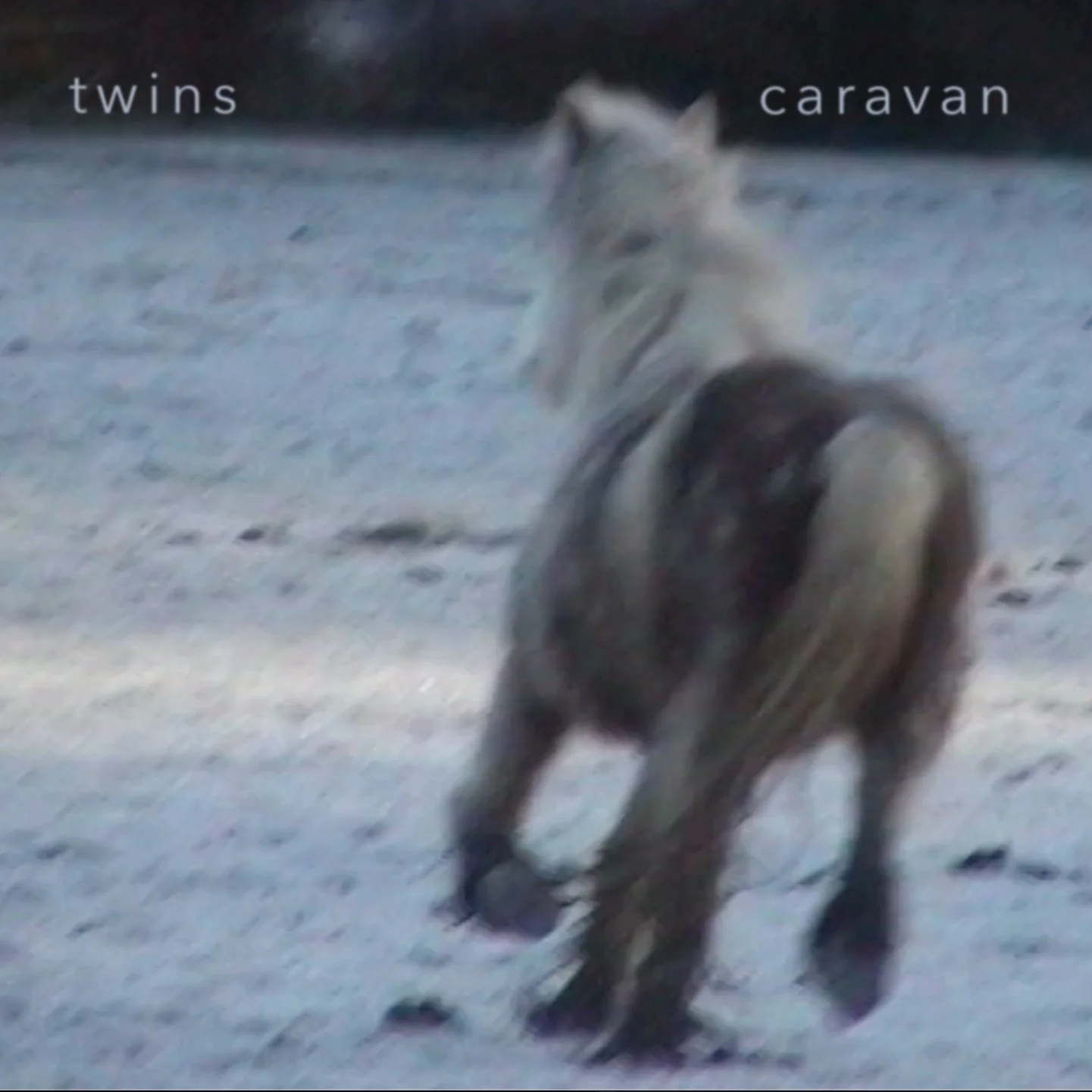TWINS TURNS GRIEF INTO GRACE ON STUNNING DEBUT ALBUM CARAVAN
At the end of 2024, Loz KeyStone, the voice and vision behind twins, left his home in South East London and relocated to a caravan on an apple farm in the UK’s West Country. The move followed a transformative period spent in Northern Colombia, where he worked with the plant medicine Ayahuasca. That experience—paired with a growing need to be closer to nature—unearthed something long buried: the desire to write and sing again, a part of himself he’d silenced for nearly a decade after the passing of his father.
With just a laptop, a few microphones, and his guitars, KeyStone began crafting what would become Caravan. This album feels more like a deeply personal journal than a traditional record. The songs are sparse, often ghostly, built around intimate arrangements of electric and classical guitars, subtle drum box rhythms, and the warm haze of vintage synths. At the center of it all is KeyStone’s confessional voice—rich, wounded, and quietly defiant.
Lyrically, Caravan explores the internal battle between who we are and the parts of ourselves that keep us from fully living. There’s self-awareness here, but also a steady, pulsing urge to break free. It’s a record that doesn’t yell to be heard, it whispers, lingers, and slowly consumes you.
Below, we explore the album track by track, diving into the sound, the sentiment, and the quiet emotional weight that makes Caravan such a haunting and unforgettable listen:
The opening track, “Avoidance,” sets the perfect tone for Caravan, the emotionally charged new album from twins.The guitar work has a wine-soaked, woozy quality that pairs beautifully with KeyStone’s raw, unguarded lyrics. It’s the kind of track that gives you goosebumps within seconds—intimate, aching, and totally exposed. KeyStone holds nothing back here, delivering a performance that feels both deliberate and deeply personal. A gorgeous harmony enters toward the end of the song, adding an unexpected warmth to all the emotional wreckage left behind. “Avoidance” doesn’t just start the album—it opens a door into a world you won’t want to leave.
“Feel Your Phone” opens with twins’ signature acoustic guitar—silky, smooth, and transportive. It feels like being dropped into the middle of a quiet wilderness, surrounded by nothing but the sound of strings and stillness. The track has a delicate melancholy that calls to mind Elliott Smith, the kind of song he might have cherished for its simplicity and emotional weight. About halfway through, a subtle crackle—reminiscent of vinyl—seeps into the mix, adding a cozy, lived-in warmth. It’s a small detail, but it changes everything, making the track feel less like a recording and more like a memory. As the song unfolds, an effected electric guitar weaves its way in, adding texture and depth without ever overpowering the intimacy. It’s a gentle, beautifully layered piece that feels both timeless and deeply personal.
“Life Forgetter,” the third track on Caravan, strikes a nerve in all the right ways. A stunning array of acoustic guitar lines circle and swell around the song’s emotional core, creating a soundscape that feels both intricate and effortless. Vocally, it’s one of the strongest performances on the record—warm, dynamic, and full of range. There’s a softness in the delivery that makes every lyric land a little deeper. The addition of bass gives the track a welcome low-end anchor, adding weight without ever dragging down the delicate atmosphere. One of the standout moments is a subtle, hypnotic effect that sounds like a reversed guitar, adding a dreamy, warped dimension that pulls you in even further. It’s unexpected, it’s cool, and we’re here for it. “Life Forgetter” doesn’t just stand out, it blooms.
“A Muted Thing” gently shifts the mood with the soft tapping of a hand on a drum box—a subtle rhythmic element that stands out after the fully acoustic intros of the earlier tracks. It’s a small but meaningful change, grounding the song in something more tactile and intimate. Lyrically, it’s one of the most emotionally potent moments on Caravan. Lines like “You might go your whole life and never feel alright” and “I want you to feel love, not as a muted thing but so completely that it’s almost too much” hit with quiet intensity. KeyStone’s vocal performance is a standout here, especially when layered with harmonies that wrap around the melody like a second heartbeat. With its raw honesty and understated arrangement, “A Muted Thing” echoes the emotional landscapes of The National and would feel perfectly at home in a film like Into the Wild. It’s a track that feels deeply lived-in, gentle, aching, and unforgettable.
“Dust,” the fifth track on Caravan, takes a distinct turn, shifting from the album’s emotional sadness into something darker and more unsettling. There’s a haunting, almost cinematic quality to the song, as if it's scored to a slow-burning sense of dread. The atmosphere is thick and ominous, with guitar work that feels tense and ghostly, like it’s creeping along the edge of something unknown. Subtle Latin influences weave their way into the rhythm and melody, giving the track a unique flavor that stands out from the rest of the album.
“Meant The World” brings Caravan back to its stripped-down acoustic roots, showcasing twins at his most poetic and reflective. The songwriting here is intimate and lyrical, with lines that feel like pages torn from a private journal. A warm, understated bassline runs beneath the track, adding depth without overpowering the delicate arrangement. It complements the acoustic guitar beautifully, giving the song a steady pulse that keeps it grounded in its quiet emotion. It’s a simple, heartfelt moment that captures the essence of the album: raw, honest, and quietly powerful.
“Caravan,” the title track and penultimate moment on the album, begins with a slow, restrained build, as if the song is trying to break free but keeps pulling itself back. There's a tension in the pacing, a quiet struggle woven into every note, making it feel emotionally heavy without saying a single word. This instrumental piece stands out precisely because of its subtlety. With no vocals, the focus shifts entirely to the textures—gentle swells, delicate melodies, and a sense of space that feels intentional and immersive. It’s a haunting, cinematic detour that adds a powerful emotional weight to the album’s final stretch. Simple, wordless, and incredibly effective.
“Here, Away” closes Caravan with quiet beauty and emotional clarity. It’s a slow-burning track, but one that earns every second of its pace. Gentle and reflective, it feels less like an ending and more like a final exhale. The chorus—“I didn’t know how to say what I mean until you said it for me and it woke me up”—hits with understated power, inviting listeners to sit with the weight of the words long after the song ends. As a closing track, it’s a perfect sendoff—subtle, moving, and deeply human. Caravan couldn’t have ended on a more graceful note.
From start to finish, Caravan unfolds like a deeply personal journey—fragile, raw, and unafraid to sit in the quiet moments. twins, crafts a world where each song feels like a snapshot of something intimate and fleeting. Whether it's the stripped-down honesty of "Avoidance," the haunting tension of "Dust," or the gentle final breath of "Here, Away," this album doesn’t just tell a story, it feels like one.
Caravan isn’t loud, but it leaves a lasting echo. It's the kind of record that sinks in slowly and stays with you long after the final note fades. Vulnerable, poetic, and carefully constructed, Twins has delivered something special here; an album that doesn’t beg for attention, but quietly earns your whole heart.

